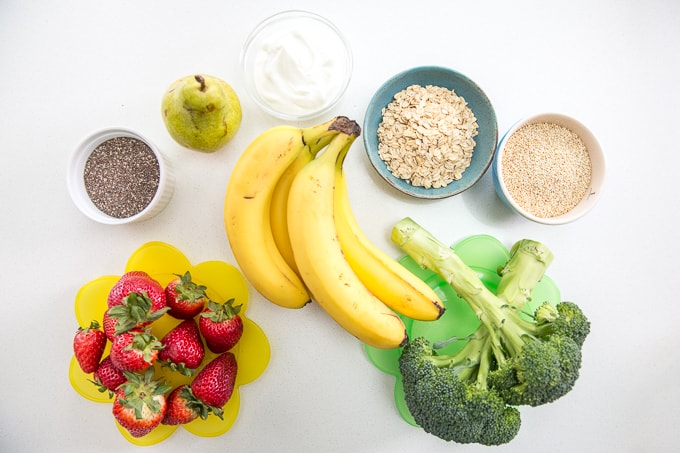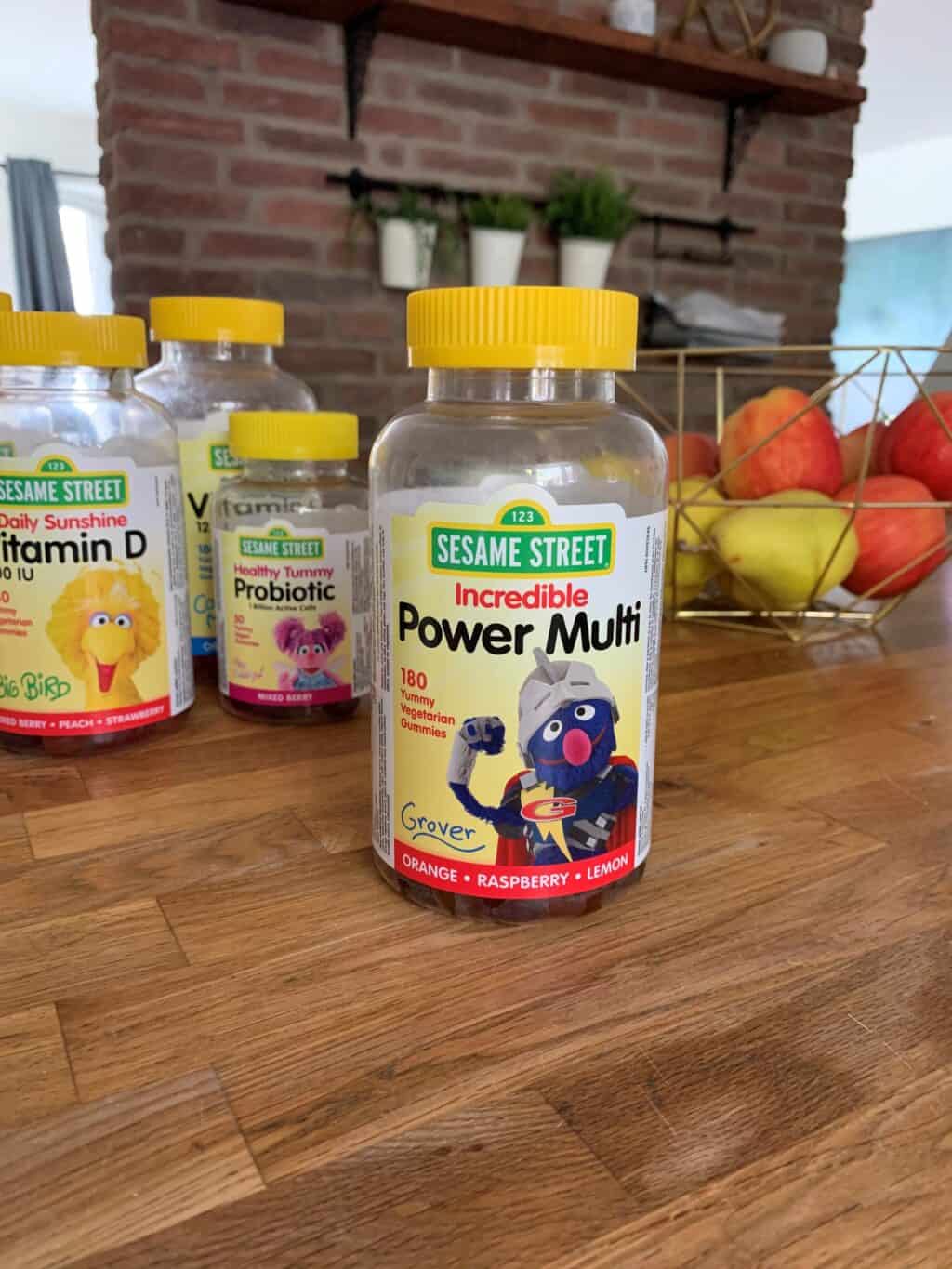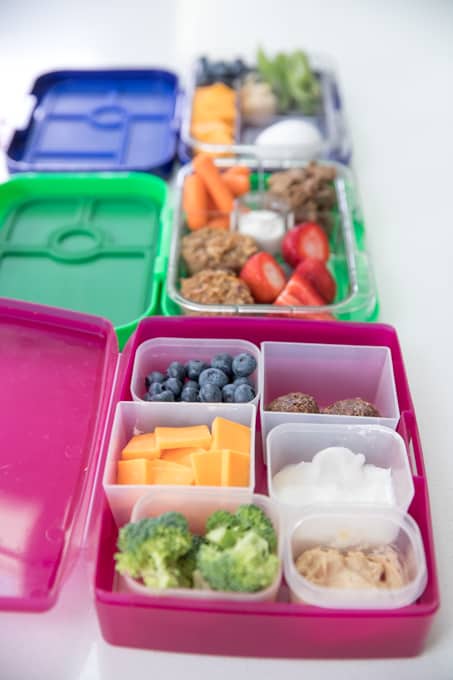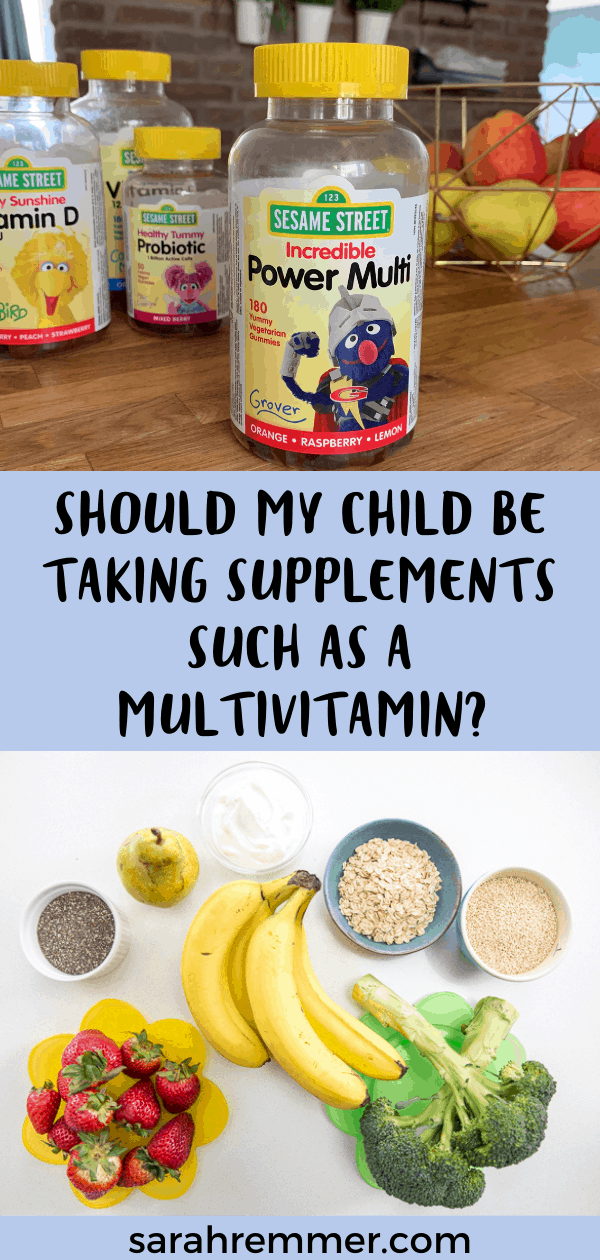Do kids need multivitamins or supplements? Here’s what you need to know about nutritional supplements, such as multivitamins, for kids.

Multivitamins for kids was written in partnership with Webber Naturals. As always, all opinions are my own!
One of the most common questions I get as a pediatric registered dietitian is “are multivitamins for kids necessary?” or “should I be giving my child nutritional supplements?” It’s a valid and important question, especially considering all of the differing opinions and misinformation out there, not to mention the fact that kids’ eating habits tend to be all over the map (my kids are no exception here!). It’s normal for kids to go through picky eating phases, and even refuse certain meals or foods. It’s also normal for kids to eat more than usual on some days.
Let’s be honest… kids’ eating patterns are quite simply… unpredictable!
Real, whole foods first, always.
First and foremost, offering a well-balanced, nutritious diet full of whole foods like fruits, veggies, protein-rich foods, whole grains and healthy fats is absolutely paramount. Supplements cannot replace the nutrients that come from nutritious foods, as they work synergistically together to provide a wide variety of health benefits. In saying this, as mentioned above, kids’ eating can be unpredictable, so supplementing with some key nutrients might be necessary. There are also some nutrients that cannot be met through food alone (hello vitamin D!), which I talk more about below.
Here’s what I’ll cover in this post:
- When to use nutritional supplements
- Vitamin D for kids
- Omega-3 fatty acids for kids
- Iron for kids
- Calcium for kids
- Multivitamins – Are they necessary?
- Probiotics – What are they and do your kids need them?
When to give your child nutritional supplements
As a Pediatric Registered Dietitian, I know that my kids are receiving most of what they require nutrition-wise by the end of the week through food, with the exception of a few key nutrients, such as vitamin D, omega-3 and occasionally, multivitamins.
Children who follow vegetarian or vegan diets may need to supplement with certain nutrients such as vitamin B12, since it’s only found in animal-based foods. And those who have celiac disease are at a higher risk for nutritional deficiencies and may need nutrition supplements too. Children who have a persistent poor appetite, extreme picky eating patterns, take certain medications or have chronic medical conditions that interfere with food intake may need a supplement too. If this is the case, it’s best to speak to a qualified health care provider (pediatrician and/or pediatric registered dietitian) to put together a plan for supplementation.
Our favourite new line of children’s nutritional supplements is Webber Naturals’ new Sesame Street vitamins (my kids LOVE them and so do I). It covers all of those key nutrients that my kids might not be getting enough of through food (vitamin D, omega-3, multivitamin, and even probiotics!). My kids line them up in the morning with their breakfast. It has become a part of our routine, and it gives me peace of mind knowing that my kids are filling those nutritional gaps for these important nutrients. I also love that they’re made with natural ingredients, gelatin-free, peanut-free, and have no artificial colours, flavours or preservatives!
Learn more about how to get your hands on these nutrition supplements at https://webbernaturals.com/en-ca/sesame-street-vitamins/.

Below, I break it down for you—nutrient by nutrient—explaining why each nutrient is important, the best sources and how much your child needs:
Vitamin D for children
We all know that breastfed babies require vitamin D3 supplements, but what many parents don’t realize is that toddlers and kids continue to require a supplement past their first birthday. In fact, the recommended amount of vitamin D jumps from 400 IUs to 600 IUs after the age of one. And if you consider that one cup of milk only contains about 80-100 IUs of vitamin D, you’ll realize that it’s almost impossible for your child to meet his or her requirements through food alone.
Other food sources of Vitamin D include fish, egg yolk, milk alternatives such as soy and margarine, but even with these, your child will still need a supplement of 400-600 IUs per day, regardless if he or she is picky or not. Vitamin D is important for bone growth (calcium absorption) and health, and there is promising research to suggest that it can help to prevent certain cancers, heart disease, autoimmune disease, and even depression. Read more about the importance of vitamin D for kids, and why I choose Webber Naturals’ Sesame Street vitamin D gummies for my kids here.
Omega-3 fatty acids for children
I’m going to go ahead and take a wild guess here – your picky eater’s favourite food is not salmon, tuna, or sardines. If I’m wrong, that is a good thing! The best way to ensure that your child consumes enough omega-3—particularly docosahexaenoic acid (DHA)—is through fatty fish such as salmon, trout or tuna (or omega-3 enriched eggs). Studies have shown that this type of omega-3 has beneficial effects on brain, nerve, and eye development in babies and children, not to mention anti-inflammatory effects that protect against chronic disease. Some evidence also suggests that DHA and EPA may help to improve cognition and behaviour in kids! Very important for the back to school season.
Although fatty fish is the gold standard, it’s not the only source. ALA (alpha-linolenic acid) is the plant-derived source of omega-3 and can be found in flaxseeds, walnuts, chia seeds, hemp hearts, soy beans, and omega-3 fortified eggs. It’s challenging to meet DHA and EPA requirements through plant or fortified sources alone (especially for a picky eater), so for those kids who don’t eat fish, I suggest giving a DHA and EPA fish oil or algae-based supplement. Some experts suggest that children aged 3-4 get 100-150 milligrams of EPA and DHA, combined, per day, and kids aged 4- 6 get 150-200 milligrams per day.
We like Webber Naturals’ Sesame Street Brilliant Omega-3 with DHA. Each gummy contains 50mg of DHA and EPA combined, so my kids take two gummies per day, and I trust they’re meeting the rest of their omega-3 requirements through food!
Iron for children
Iron and calcium (which I talk about below) are two very important minerals when it comes to growth and development in kids. Iron is found in beef, pork, turkey, beans and certain vegetables such as spinach. Iron helps build muscle and is needed to produce red blood cells. Signs of low iron levels include a lack of energy, nervousness and increased infections. Kids 1-3 years old require 7mg of iron total per day, 4-8 years old require 10 mg per day and 9-13 years old require 8mg per day. Here’s more information on foods that contain iron, as well as amounts.
Calcium for children
Calcium is needed to grow healthy bones. It is found in milk, sardines and fortified plant-based beverages and juices, with smaller amounts in broccoli and spinach. A lack of calcium can lead to poor growth and osteoporosis later in life. In terms of amounts, 1-3 year-olds require 700mg calcium per day; 4-8 year-olds require 1,000 mg per day and 9-13 year-olds require 1,300mg per day. Here’s more information on food sources of calcium (and amounts).
According to the American Academy of Pediatrics, most children do not get enough iron and calcium from their diets, so if you suspect that your child isn’t meeting their needs, talk to your health care provider.

Multivitamin/mineral supplements for children
A children’s multivitamin isn’t always necessary, especially if your child eats a wide variety of nutritious foods every day. However, it might be necessary to top up key nutrients if your child is going through a picky eating phase or not eating optimally for a period of time.
Children’s multivitamins (such as our fave – Webber Naturals Sesame Street “Power Multi”) contain important nutrients for growth and development, such as B vitamins, vitamin A, vitamin C and more. B vitamins help with metabolism and energy (these are naturally found in animal products such as meat, eggs and dairy, as well as nuts, beans and soybeans). Vitamin A is important for normal growth and promotes healthy skin and eyes, immunity, and tissue and bone repair (natural food sources include yellow and orange vegetables, milk, cheese and eggs). Vitamin C is an important antioxidant that helps to support immune function, production and repair of collagen, muscle and other tissues, as well as wound healing.
To know whether or not a multivitamin is necessary, ask yourself if your child is getting enough of these foods everyday:
- Fruits and vegetables: Fruits and veggies contains contain many important vitamins and minerals such as vitamin C, vitamin A, and potassium. If your kids eat a nice variety of fruits and veggies every day, they are well on their way to meeting many of their vitamin needs.
- Fortified foods: Pasta, cereal bars, granola bars, breakfast cereals, eggs, bread, and flour are all foods that might be fortified with vitamins and minerals and could already be acting as a multi-vitamin/mineral supplement. Go through your pantry, check labels—your child might be getting more than you think!

Probiotics for children (Optional)
Probiotics are “good” bacteria, and when consumed in sufficient amounts, may provide some health benefits (and keep all things “gut” in check). The world of probiotics is fascinating and still largely unknown—more research is needed in order to give solid advice on probiotic supplementation, especially with kids. What we do know is that some evidence shows that if humans can maintain a healthy gut microbiome (a favourable ratio of good to bad bacteria in the gut), it can protect against certain chronic diseases, autoimmune diseases, and more. Probiotics may also be able to support your child’s immune response, helping to prevent illness such as respiratory infections (however research is limited).
Although probiotics can be found in certain foods such as yogurt, the live bacterial cell count is relatively low compared to a supplement, which often have at least a billion active cells per serving. If you’re thinking about giving your child a probiotic supplement, talk to your health professional first to discuss which strain and daily amount makes most sense for your child.
The bottom line on supplements for kids
Discuss supplements with your child’s health care provider (such as a family doctor, pediatrician or registered dietitian) before giving them to your child. Taking large amounts of vitamins that exceed the recommended daily amount can be toxic and lead to symptoms such as nausea, headaches or diarrhea (this is a thing!). So please always store supplements out of reach from children.








![[AD] It’s Day 6 of my 15-Minute Supper Series and today we’re putting a delicious twist on a classic BLT to make it nourishing and meal-worthy 🤤
Make sure to comment “Spud” and I’ll send you my top dietitian tips for feeding your family on busy weeknights along with a huge list of meal ideas!
This pasta salad takes no time at all to throw together and has everything you need for a nourishing meal. I always make extra bacon for things like this, but if you don’t have any cooked bacon I find cooking it in the airfryer or stovetop the quickest 🥓
I find that this salad lasts 2-3 days in the fridge without getting too soggy. You can also add in fresh lettuce to crisp it up or add the dressing when you eat it.
I ordered all of my groceries from @spuddelivers, which always saves me time and effort and gives me peace of mind knowing that I’m using high-quality, local and sustainable ingredients. I love that they come straight to my door the day after ordering 🙌🏻
Let’s make it!
Ingredients:
* 10 slices bacon cooked and diced
* 12 ounces pasta cooked and cooled
* 1 cup homemade Ranch dressing
* 1 ½ cup baby tomatoes diced
* ½ avocado diced
* feta
* ⅓ cup red onion diced
* 1 cup romaine lettuce
* fresh parsley for garnish optional
Homemade ranch dressing:
* ¾ cup mayonnaise
* ½ cup sour cream or Greek yogurt
* ½ teaspoon dried chives
* ½ teaspoon dried parsley
* ½ teaspoon dried dill weed
* ¼ teaspoon garlic powder
* ¼ teaspoon onion powder
* Salt and pepper to taste
Make it:
1. Blend all Ranch dressing ingredients together in a small blender (or whisk by hand) and set aside.
2. In a large bowl assemble the pasta, tomatoes, avocado, cheese, red onion, lettuce and bacon.
3. Pour the dressing over and toss to combine.
4. Garnish with parsley and serve.
You are going to LOVE this meal-worthy salad, I promise!
Comment SPUD to receive my top dietitian-approved tips for feeding your family during the week, a long list of ideas, and a curated shopping list with all of the ingredients for this recipe + all of the other ideas that I share in this resource!
#sponsored #spuddelivers #15minutemeals #whatsfordinner #easymealideas #dietitianapproved](https://www.sarahremmer.com/wp-content/uploads/sb-instagram-feed-images/438745920_798281295514125_2547899647147267180_nfull.jpg)
Leave a Comment